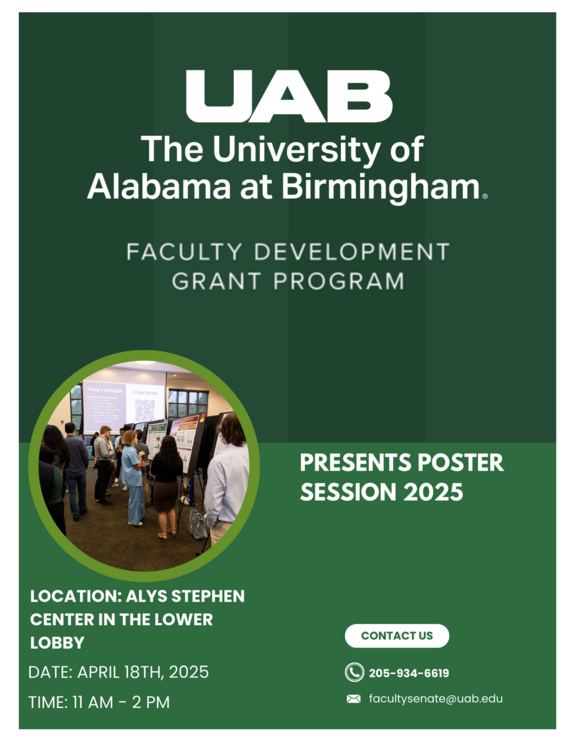 Projects examining teacher leadership, rare pancreatic tumors and social media interventions are among the innovative works that will be shared as part of a Faculty Development Grant Program poster session April 18. The event, held from 11 a.m.-2 p.m. in the Alys Stephens Center lower lobby, is hosted by the UAB Faculty Senate. The first 50 attendees will receive UAB Faculty Senate swag.
Projects examining teacher leadership, rare pancreatic tumors and social media interventions are among the innovative works that will be shared as part of a Faculty Development Grant Program poster session April 18. The event, held from 11 a.m.-2 p.m. in the Alys Stephens Center lower lobby, is hosted by the UAB Faculty Senate. The first 50 attendees will receive UAB Faculty Senate swag.
The Faculty Development Grant Program, or FDGP, provides seed money for research, scholarship and creative activities in a faculty member’s discipline. It is funded through the UAB Faculty Senate in collaboration with the UAB Office of the Provost. The FDGP is particularly designed to provide funds for new work for which money is not generally available. The program is targeted to early-career instructors and assistant professors. Associate professors whose funding does not exceed $100,000 per year are also eligible to apply.
The funding can be used to develop manuscripts, publications, presentations, grant applications, future research initiatives, creative works and new skills to enhance peer recognition outside of UAB.
Among the 20 or so faculty from across campus who will present at this year’s poster session is Miyoshi Juergensen, Ph.D., assistant professor in the Department of Human Studies in the UAB School of Education and Human Sciences. Juergensen will share findings from her project, which analyzed the impact of teacher-led research on classroom-level achievement data and explored teachers’ perspectives on how teacher-led research had impacted their instructional practice.
Amir Karami, Ph.D., associate professor of Quantitative Methods and Business Analytics in the Collat School of Business, will share the results of his project, which examined the outcomes of interventions adopted by social media companies to reduce the spread of health misinformation on their platforms.
And Rachael Guenter, Ph.D., assistant professor in the Department of Surgery in the Heersink School of Medicine, will explain how FDGP support allowed her to generate new understanding of the biology of rare pancreatic neuroendocrine tumors. These tumors are diagnosed in about 4,000 people annually and are “drastically understudied,” as she stated in her project abstract. Guenter’s project tested the hypothesis that the Notch 1 signaling pathway could be a predictive biomarker for the efficacy of a new class of drugs called HIF–2[alpha] inhibitors in pancreatic neuroendocrine tumors.
Meet these faculty and many more at the Faculty Development Grant Program poster session April 18; find more details online.